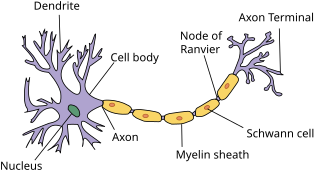Neuron
electrically excitable cell that communicates via synapses From Wikipedia, the free encyclopedia
Remove ads
A neuron[1] (or neurone) is a nerve cell that carries electrical impulses.[2] Neurons are the basic units of our nervous system.

Neurons have a cell body (soma or cyton), dendrites and an axon.[2] Dendrites and axons are nerve fibers. There are about 86 billion neurons in the human brain. Almost all brain cells are neurons. The human brain has about 16 billion neurons in the cerebral cortex. The neurons are supported by glial cells and astrocytes.
Neurons are connected to one another, but they do not actually touch each other. Instead they have tiny gaps called synapses. These gaps are chemical synapses or electrical synapses which pass the signal from one neuron to the next.
Neuron ( link )[1]
Remove ads
Types of neurons
By connection
There are three classes of neurons: motor neurons, sensory neurons and inter neurons.
- Sensory neurons carry information from tissues and organs into the central nervous system.
- Motor neurons transport signals from the central nervous system to the effector cells.
- Interneurons connect neurons within the central nervous system.
By function
- Sensory neurons carry signals from sense organs to the spinal cord and brain.
- Relay neurons carry messages between sensory or motor neurons and the central nervous system
- Motor neurons carry signals from the CNS to muscles, motor neurons are connected to the relay neurons. The signal passes between the neurons via synapses. Synapses are microscopic voids between cells where chemicals are released from the axon terminal of one cell to specialized chemical receptors on the dendrite of the receiving cell.
Remove ads
Cell division
Mature neurons never divide: that is the general rule. They do not undergo cell division. In most cases, neurons are generated by special types of stem cells. A type of glial cell, called astrocytes, have also been seen to turn into neurons. In humans, neurogenesis (the origin of new nerve cells) largely ceases during adulthood – but in two brain areas, the hippocampus and the olfactory bulb, there is strong evidence for substantial numbers of new neurons.[3][4][4][5][6]
Remove ads
Related pages
References
Other websites
Wikiwand - on
Seamless Wikipedia browsing. On steroids.
Remove ads
